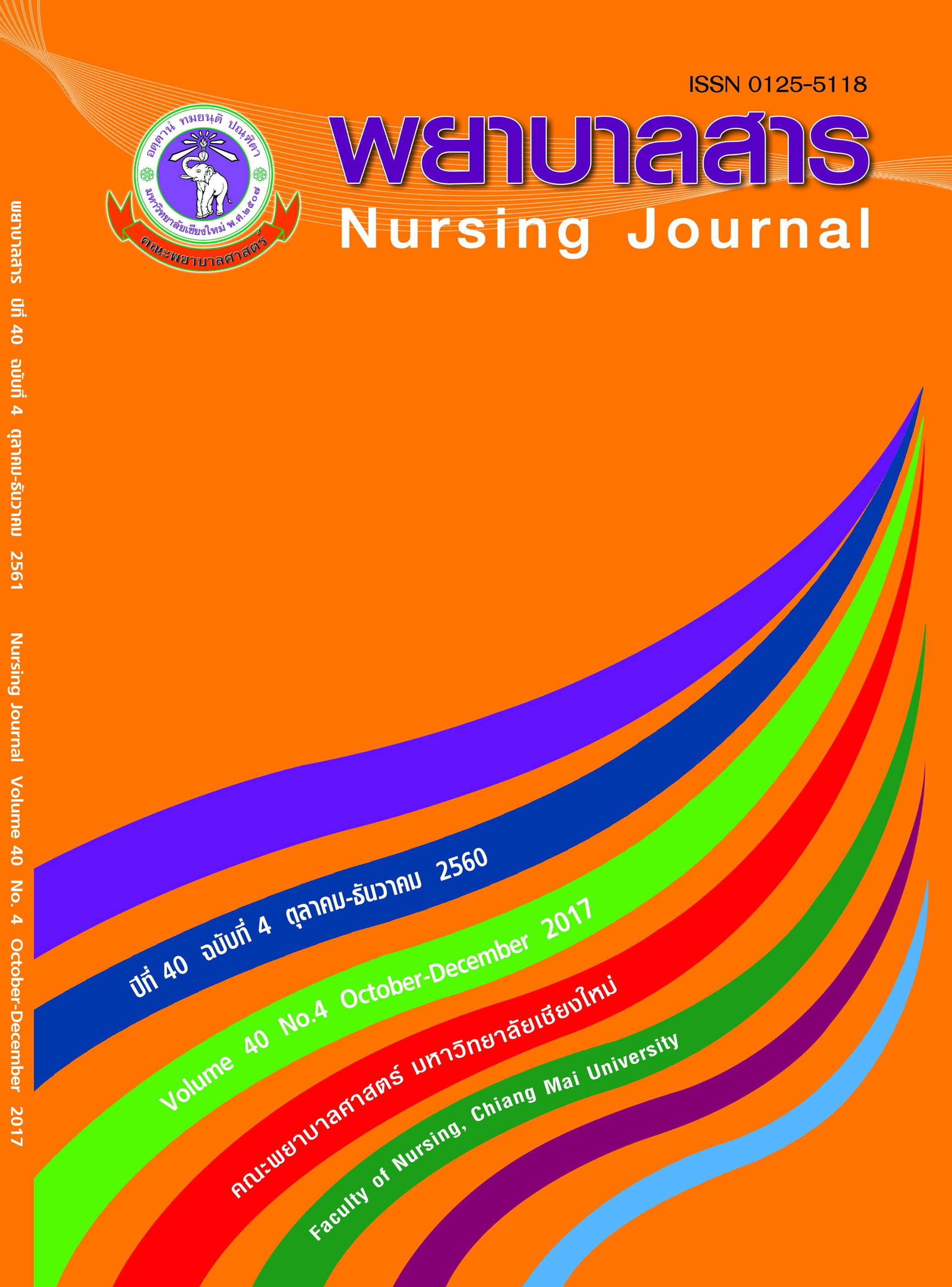Teaching Models to Enhance the 21st Century Skills for Bachelor’s degree Nursing Students
Keywords:
21st century skills, learner-centeredness, action learningAbstract
Teaching to promote university students’ learning skills in the 21st century is very important. Teachers should pay attention to their teaching plans and strategies so that the students’ learning outcomes as set in the study program can be achieved. The learning skills gained by students in the 21st century should promote them to be smart, moral-minded, and happy. These skills are vital and essential in the globalization era and for ‘Thailand 4.0’s national development policy that has a vision of “stability, prosperity, and sustainability”. This article aims to present a model of teaching and learning to enhance nursing students’ skills in the 21st century. Based on a review of literature and content analysis, teaching should include action learning in real nursing practice that emphasizes learner-centeredness. The learning activities should promote an eagerness to learn and the hands-on practice of students as well as make them apply a thinking process in what they are doing so that they can develop their knowledge. Teachers and educators should apply this teaching model for undergraduate nursing students in their teaching and in nursing education which consists of four main strategies: 1) experience sharing, 2) knowledge development and management, 3) knowledge presentation, and 4) hand-on practice (active learning) or knowledge application.
References
ไชยยศ เรืองสุวรรณ. (2553). Active Learning. ข่าวสารวิชาการ คณะเภสัชศาสตร์ มหาวิทยาลัยเชียงใหม่
ประจำเดือนพฤศจิกายน 2553.
ณัฐกร สงคราม. (2553). การออกแบบและพัฒนามัลติมีเดียเพื่อการเรียนรู้. กรุงเทพฯ: จุฬาลงกรณ์มหาวิทยาลัย.
ทิศนา แขมมณี. (2557). ศาสตร์การสอน: องค์ความรู้เพื่อการจัดกระบวนการเรียนรู้ที่มีประสิทธิภาพ (พิมพ์ครั้งที่ 18). กรุงเทพฯ: จุฬาลงกรณ์มหาวิทยาลัย.
________. (2554). รูปแบบการเรียนการสอน: ทางเลือกที่หลากหลาย (พิมพ์ครั้งที่ 7). กรุงเทพฯ: จุฬาลงกรณ์มหาวิทยาลัย.
________. (2543). 14 วิธีสอน สําหรับครูมืออาชีพ. กรุงเทพ ฯ : จุฬาลงกรณ์มหาวิทยาลัย.
มนตรี ศิริจันทร์ชื่น. (2554). การสอนนักศึกษากลุ่มใหญ่ในรายวิชารายวิชา Gsoc 2101 ชุมชน กับการพัฒนา โดยใช้การสอนแบบ Active learning และการใช้บทเรียนแบบ e-learning. คณะมนุษยศาสตร์และสังคมศาสตร์ มหาวิทยาลัยราชภัฏเชียงใหม่.
วิจารณ์ พานิช. (2555). วิถีสร้างการเรียนรู้เพื่อศิษย์ในศตวรรษที่21. กรุงเทพฯ : มูลนิธิสดศรี- สฤษดิ์วงศ์
วิโรจน์ สารรัตนะ. (2556). กระบวนทัศน์ใหม่ทางการศึกษากรณีทัศนะต่อการศึกษาศตวรรษที่21. กรุงเทพฯ : หจก.ทิพยวิสุทธ
สถาพร พฤฑฒิกุล. (2555). คุณภาพผู้เรียน เกิดจากกระบวนการเรียนรู้. วารสารการบริหารการศึกษา มหาวิทยาลัยบูรพา ปีที่ 6 ฉบับที่ 2 เดือนเมษายน - กันยายน.
สมจิต จันทร์ฉาย. (2557). การออกแบบและการพัฒนาการเรียนการสอน. คณะครุศาสตร์
มหาวิทยาลัยราชภัฏนครปฐม.
สุมน อมรวิวัฒน์. (2533). การสอนโดยสร้างศรัทธาและโยนิโสมนสิการ. กรุงเทพฯ: โรงพิมพ์ ตรีรณสาร.
ศักดิ์ชัย นิรัญทวี และไพเราะ พุ่มมั่น. (2542). วัฏจักรการเรียนรู้ (4 MAT) การจัดกระบวนการเรียนรู้เพื่อการส่งเสริมคุณลักษณะเก่ง ดี มีสุข.กรุงเทพฯ : แว่นแก้ว.
ศักดา ไชกิจเจริญภิญโญ. (2548). สอนอย่างไรให้ Active Learning. วารสารนวัตกรรมการเรียนการสอน. 2, หน้า 12-15.
อรทัย มูลคํา และคณะ. (2543). Child Centered :Storyline Method: การบูรณาการหลักสูตรและการ
เรียนการสอนโดยเน้นผู้เรียนเป็นศูนย์กลาง.พิมพ์ครั้งที่ 4.กรุงเทพมหานคร:ดวงกมลสมัย.
Council for the Curriculum, Examinations and Assessment . (2007). Active Learning and
Teaching Methods. A PMB publication, UK.
Johnson. D.W. & Johnson. R.T. (1974). Instructional goal structure : Cooperative. competitive,
or individualistic. Review of Educational Research, 44. 213-240.
Joyce, B, & Weil, M. (1996). Model of teaching. 5th ed. Boston : Allyn and Bacon.
Trilling, B., & Fadel, C. (2009). 21st Century Skills: Learning for Life in Our Times. San
Francisco, CA: Jossey-Bass.
Torrance, E. P. (1962). Guiding creative talent. NJ: Prentice-Hall.
Downloads
Published
How to Cite
Issue
Section
License
บทความที่ได้รับการตีพิมพ์เป็นลิขสิทธิ์ของวารสารพยาบาลสาร
ข้อความที่ปรากฏในบทความแต่ละเรื่องในวารสารวิชาการเล่มนี้เป็นความคิดเห็นส่วนตัวของผู้เขียนแต่ละท่านไม่เกี่ยวข้องกับมหาวิทยาลัยเชียงใหม่ และคณาจารย์ท่านอื่นๆในมหาวิทยาลัยฯ แต่อย่างใด ความรับผิดชอบองค์ประกอบทั้งหมดของบทความแต่ละเรื่องเป็นของผู้เขียนแต่ละท่าน หากมีความผิดพลาดใด ๆ ผู้เขียนแต่ละท่านจะรับผิดชอบบทความของตนเองแต่ผู้เดียว






